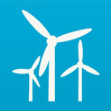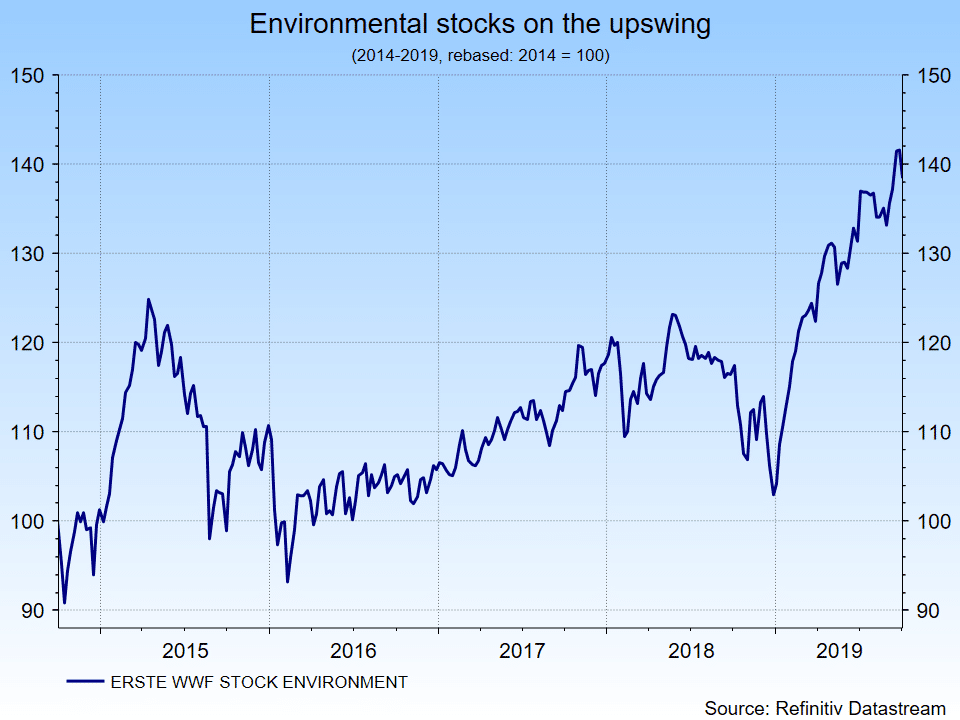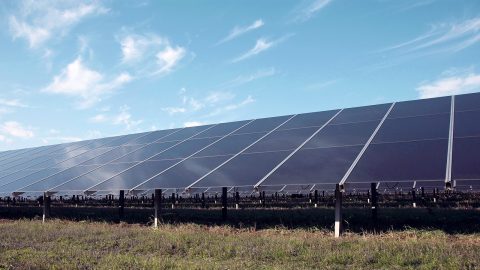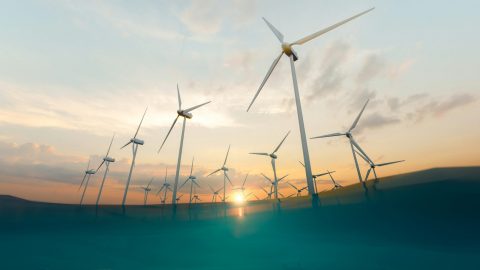Leveraging the right kind of companies
Autumn has arrived, and we are looking back at a summer which gave us the hottest July since the beginning of weather records in 1880. The climate is changing noticeably. This is a hot topic not only in science circles.
In the area of climate protection, companies that have dedicated their business model to the fight against the negative impact of climate change are successful. This includes topics such as electromobility, the storage and transport of energy, alternative energy production, hydrogen and fuel cells, and recycling. The mega trend of environment & clean energy has become a core issue in the investment world.
The financial industry and its investments provide a way of driving decarbonisation in the economy and a turn towards renewable energy.
Population explosion in the cities
The climate is changing, and the pressure on politics resulting from urbanisation (i.e. people moving into cities) is on the rise. Nowadays, 55percent of people live in cities. This percentage will increase to 70percent by 2050.
The people living there need electricity, water, and transport; their consumer behaviour has converged with Western habits, producing growing piles of waste. We therefore need new technologies in order to be able to overcomes these challenges.
Environmental topics are a task for innovative companies

Picture: Erste AM fund manager Clemens Klein: environmental technology sector : “In 2040, 60percent of all new cars will be electric”
Erste Asset Management recognised the dynamics of the environmental sector early on. We have had investment vehicles in our range of products since 2001 that let investors participate in the shares of companies with environmental and climate protection as their core business. “Our philosophy is to identify companies whose products and services are crucial for overcoming the effects of mega trends such as population growth, urbanisation, the growing middle class and the resulting issues like greenhouse gases, climate change, scarce resource and an increase in the volume of waste,” explains Clemens Klein, the fund manager responsible.
The top five environmental technology sectors of the future
 Renewable energy. Solar and wind power are already the cheapest technologies for power generation across many countries. As a result, the rapid growth of recent years is set to continue, regardless of subsidies. In addition, new markets such as India, South America, and Africa will become key markets for the solar and wind power industry. The share of solar power in total global power production will increase from currently 3percent towards 30percent by 2050. We envisage a similar development for wind power. In the long run, global electricity will become clean. Companies playing a major part in this context are for example the wind blades producer TPI Composites, the wind turbine manufacturer Vestas, or the US photovoltaic manufacturer First Solar.
Renewable energy. Solar and wind power are already the cheapest technologies for power generation across many countries. As a result, the rapid growth of recent years is set to continue, regardless of subsidies. In addition, new markets such as India, South America, and Africa will become key markets for the solar and wind power industry. The share of solar power in total global power production will increase from currently 3percent towards 30percent by 2050. We envisage a similar development for wind power. In the long run, global electricity will become clean. Companies playing a major part in this context are for example the wind blades producer TPI Composites, the wind turbine manufacturer Vestas, or the US photovoltaic manufacturer First Solar.
 Mobility & e-cars. New drive technologies such as electric vehicles, hydrogen cars, and third-generation bio fuel will continue to gain relevance. Here, too, falling costs in addition to environmental aspects will lead to above-average growth rates. Nowhere else will the technological progress be monitored with as much suspense as in the next generation of vehicles. According to Bloomberg New Energy Finance, 60percent of all new cars bought in 2040 will be electric. The 2016 estimates were at 35percent. In Europe, Norway is the leader with more than half of new cars being electric: along with tax incentives, it is possible to use the bus lane, and you do not need a tax disc on the motorway when driving an electric car. But we cannot turn a blind eye to the problems: we need safe, affordable batteries with sufficient range. And we have to sort out where the raw materials for production will come from and what happens to the batteries at the end of their useful lives. “Companies have to certify that their suppliers do not use cobalt from the Congo. That would not agree with us as sustainable investors.,” as fund manager Klein points out. The important issue is the existence of some form of environmental benefit. At any rate, the greenhouse gas emissions of an e-car are clearly below those of a petrol or a diesel car. Among the listed companies well known for their efforts in electromobility and hydrogen technology are Powercell, Ballard Power Systems or NEL ASA.
Mobility & e-cars. New drive technologies such as electric vehicles, hydrogen cars, and third-generation bio fuel will continue to gain relevance. Here, too, falling costs in addition to environmental aspects will lead to above-average growth rates. Nowhere else will the technological progress be monitored with as much suspense as in the next generation of vehicles. According to Bloomberg New Energy Finance, 60percent of all new cars bought in 2040 will be electric. The 2016 estimates were at 35percent. In Europe, Norway is the leader with more than half of new cars being electric: along with tax incentives, it is possible to use the bus lane, and you do not need a tax disc on the motorway when driving an electric car. But we cannot turn a blind eye to the problems: we need safe, affordable batteries with sufficient range. And we have to sort out where the raw materials for production will come from and what happens to the batteries at the end of their useful lives. “Companies have to certify that their suppliers do not use cobalt from the Congo. That would not agree with us as sustainable investors.,” as fund manager Klein points out. The important issue is the existence of some form of environmental benefit. At any rate, the greenhouse gas emissions of an e-car are clearly below those of a petrol or a diesel car. Among the listed companies well known for their efforts in electromobility and hydrogen technology are Powercell, Ballard Power Systems or NEL ASA.
 Water supply and water supply technology
Water supply and water supply technology
Global water demand will increase by more than 50percent by the year 2050 due to the aforementioned mega trends. Urbanisation and rising income have caused a shift in consumer behaviour. Therefore, new investments in infrastructure, in the reduction of consumption and costs, hygiene, water treatment, and sea water desalination are necessary. A leading company in the field of water infrastructure, water analysis, and water treatment is Xylem.
 Waste collection and separation
Waste collection and separation
The volume of global waste will have doubled from 2014 to 2025 to 6mn tonnes per day and could rise further to 11mn tonnes per day by 2100. Even now, more than 8mn tonnes of plastic make it into the oceans every year. This is tantamount to 16 Burj Chalifas, i.e. the highest building in the world, or 32,000 Giant Wheels in the Vienna Prater. Without steps against this enormous explosion of waste, we are facing a situation where by 2050 there will be more plastic than fish in the sea, going by weight. The avoidance, the separation, the collection of waste, recycling, and new packaging technologies will be central issues in the environmental sector. Tomra Systems, the world market leader in waste separation, waste sorting, and recycling has developed systems that are also used in our supermarkets.
Environmental stocks up significantly this year

Legal note: Prognoses are no reliable indicator for future performance.
Investing in environmental technology
These and other companies in the environmental technology sector are also in the newly launched ERSTE FUTURE INVEST fund, for which the subscription period is open as we speak (please subscribe at Erste Bank and Sparkasse). This fund covers five large mega trends that the experts of Erste Asset Management have defined. In addition to environment & clean energy, these are lifestyle, technology & innovation, healthcare, and emerging markets. For more information on these megatrends, please follow the link here.
Warning notices according to the Austrian Investment Fund Act of 2011
ERSTE FUTURE INVEST may be subject to elevated levels of volatility due to its composition, i.e. the fund share price may fluctuate significantly both ways within short periods of time.

Legal note:
Prognoses are no reliable indicator for future performance.
Legal disclaimer
This document is an advertisement. Unless indicated otherwise, source: Erste Asset Management GmbH. The language of communication of the sales offices is German and the languages of communication of the Management Company also include English.
The prospectus for UCITS funds (including any amendments) is prepared and published in accordance with the provisions of the InvFG 2011 as amended. Information for Investors pursuant to § 21 AIFMG is prepared for the alternative investment funds (AIF) administered by Erste Asset Management GmbH pursuant to the provisions of the AIFMG in conjunction with the InvFG 2011.
The currently valid versions of the prospectus, the Information for Investors pursuant to § 21 AIFMG, and the key information document can be found on the website www.erste-am.com under “Mandatory publications” and can be obtained free of charge by interested investors at the offices of the Management Company and at the offices of the depositary bank. The exact date of the most recent publication of the prospectus, the languages in which the fund prospectus or the Information for Investors pursuant to Art 21 AIFMG and the key information document are available, and any other locations where the documents can be obtained are indicated on the website www.erste-am.com. A summary of the investor rights is available in German and English on the website www.erste-am.com/investor-rights and can also be obtained from the Management Company.
The Management Company can decide to suspend the provisions it has taken for the sale of unit certificates in other countries in accordance with the regulatory requirements.
Note: You are about to purchase a product that may be difficult to understand. We recommend that you read the indicated fund documents before making an investment decision. In addition to the locations listed above, you can obtain these documents free of charge at the offices of the referring Sparkassen bank and the offices of Erste Bank der oesterreichischen Sparkassen AG. You can also access these documents electronically at www.erste-am.com.
Our analyses and conclusions are general in nature and do not take into account the individual characteristics of our investors in terms of earnings, taxation, experience and knowledge, investment objective, financial position, capacity for loss, and risk tolerance. Past performance is not a reliable indicator of the future performance of a fund.
Please note: Investments in securities entail risks in addition to the opportunities presented here. The value of units and their earnings can rise and fall. Changes in exchange rates can also have a positive or negative effect on the value of an investment. For this reason, you may receive less than your originally invested amount when you redeem your units. Persons who are interested in purchasing units in investment funds are advised to read the current fund prospectus(es) and the Information for Investors pursuant to § 21 AIFMG, especially the risk notices they contain, before making an investment decision. If the fund currency is different than the investor’s home currency, changes in the relevant exchange rate can positively or negatively influence the value of the investment and the amount of the costs associated with the fund in the home currency.
We are not permitted to directly or indirectly offer, sell, transfer, or deliver this financial product to natural or legal persons whose place of residence or domicile is located in a country where this is legally prohibited. In this case, we may not provide any product information, either.
Please consult the corresponding information in the fund prospectus and the Information for Investors pursuant to § 21 AIFMG for restrictions on the sale of the fund to American or Russian citizens.
It is expressly noted that this communication does not provide any investment recommendations, but only expresses our current market assessment. Thus, this communication is not a substitute for investment advice.
This document does not represent a sales activity of the Management Company and therefore may not be construed as an offer for the purchase or sale of financial or investment instruments.
Erste Asset Management GmbH is affiliated with the Erste Bank and austrian Sparkassen banks.
Please also read the “Information about us and our securities services” published by your bank.


